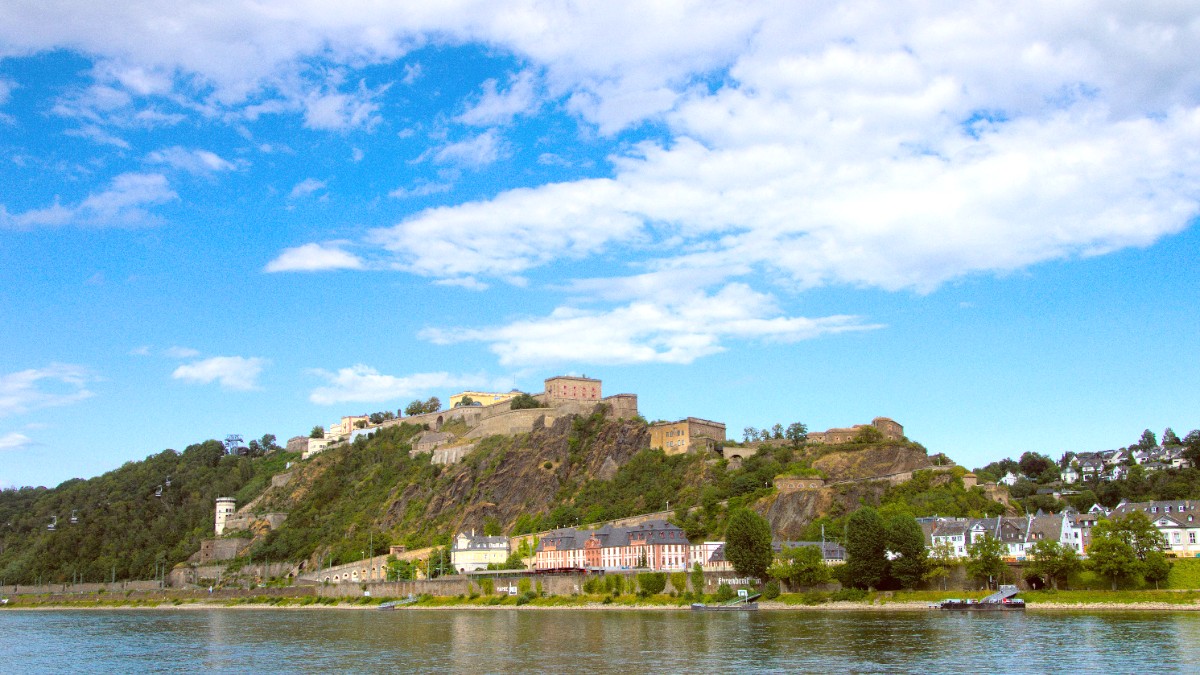
Germany
During spring (April-May), average temperatures range from 8°C to 15°C (46-59°F). The weather is generally mild, but can be unpredictable, with occasional moderate precipitation. The air feels crisp, and longer daylight hours make outdoor activities more comfortable. Cooler mornings give way to pleasant, sunny afternoons.
Summer (June-August) brings the warmest and sunniest period to Koblenz, with average temperatures from 17°C to 25°C (63-77°F). Temperatures occasionally climb higher, into the low 30s°C (high 80s°F). This season is ideal for river cruises, hiking, cycling, and outdoor festivals. Summer can see occasional thunderstorms, especially in the late afternoon. Humidity levels are generally moderate.
Koblenz does not experience monsoons or hurricanes. Extreme heatwaves or prolonged periods of severe cold are rare but can occur during summer and winter respectively. Staying hydrated is important during summer heatwaves.
River levels on the Rhine and Moselle can rise after periods of heavy rainfall. Major flooding that significantly impacts tourism infrastructure is uncommon. Travelers monitor local weather forecasts for updates.
(June-August)
Warm, sunny conditions. Numerous outdoor festivals, including "Rhein in Flammen" in August. Longest daylight hours.
Tourist attractions are more crowded. Prices for accommodation and tours are at their peak.
(April-May, Sept-Oct)
Pleasant temperatures without intense summer heat. Fewer crowds, often moderate accommodation prices. Ideal for hiking and cycling.
Weather can be less predictable. Some attractions may have reduced hours. Layers are suitable for changing temperatures.
(November-March)
Significant reduction in tourist numbers, lower accommodation prices. Authentic local experiences. Festive Christmas markets (late Nov-Dec).
Weather is colder, daylight hours are short. Some outdoor attractions, like river cruises, may have limited operations.
Late spring to early autumn (May-September) brings optimal weather for river cruises, hiking, and cycling. All river cruise services and rental facilities for hiking and cycling are fully operational.
Late summer to early autumn (August-October) aligns with annual wine festivals and the grape harvest season. Vineyards are bustling, and local taverns celebrate with special events and tastings.
May-September
August-October
Late November-December
Autumn (for foliage)
Shoulder seasons (less crowded)
The currency used in Koblenz, and throughout Germany, is the Euro (€). ATMs (Geldautomat) are widely available. Credit and debit cards (Visa, Mastercard, Maestro) are widely accepted in most hotels, larger restaurants, and major shops. Some smaller establishments, local bakeries, or street food vendors may prefer or only accept cash ("Nur Barzahlung"). Carry some cash for smaller purchases. Contactless payment options are increasingly common.
Hostel dorm bed: €25-€40
Budget meal (bakery sandwich, Döner Kebab, Currywurst, Imbiss): €5-€10
Be ready to present necessary documents for entry into the Schengen Area.
Koblenz is a very safe city with low crime rates. Violent crime against tourists is extremely rare. General precautions against petty crime are advisable in crowded tourist areas.
Koblenz is a very safe city, and Germany maintains a high standard of public health and safety. Being informed about health recommendations and safety measures promotes a pleasant and worry-free trip.
Routine vaccinations (MMR, DTaP, Polio, Hepatitis B, Influenza) are recommended. Consult your doctor.
Limited to minor ailments. High hygiene standards minimize foodborne/waterborne risks. Stay hydrated, wash hands.
Pack small quantities of over-the-counter medications. Carry prescription medications in original packaging with documentation.
Emergency Number: 112 (Police, Fire, Ambulance)
Germany possesses an excellent, high-quality healthcare system. Medical facilities, including hospitals (Krankenhaus) and pharmacies (Apotheke), are readily available throughout Koblenz. Pharmacies provide over-the-counter medications and advice for minor ailments.
For non-emergencies, your hotel reception assists in finding a local practitioner. It is helpful to have travel insurance details ready. For specific products, Adventure Medical Kits for first aid supplies.
Police (non-emergency): 110.
Passport must be valid for at least three months beyond your departure from the Schengen Area. If a visa is required, ensure it is approved and affixed in your passport.
Ready hotel bookings or invitation letters. Show financial resources to cover your stay via bank statements or credit cards.
A confirmed return or onward ticket. Travel insurance for medical emergencies and repatriation (minimum €30,000 coverage).
Natural disaster risks in Koblenz are generally low. The region is not prone to earthquakes, volcanic eruptions, or severe storms like hurricanes.
Prior to travel, family or close contacts at home have a copy of your itinerary, including flight details, accommodation information, and emergency contact numbers. Keep a physical copy of important phone numbers readily accessible.
Emergency (Police, Fire, Ambulance): 112. Police (non-emergency): 110.
Pharmacies (Apotheke): rotating late-night/weekend schedule. Hotel reception helps find local practitioners.
Familiarize yourself with your country's embassy or nearest consulate in Germany for assistance with lost passports or legal issues. Consider AirHelp for flight disruptions.